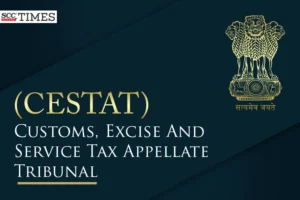Customs, Excise and Service Tax Appellate Tribunal, New Delhi: In an appeal filed by the appellant-Paramount Infraventures Pvt. Ltd., the bench of Rachna Gupta, member (Judicial) and Hemambika R. Priya (Technical) referred to the definition of road in various dictionaries and opined that the racetrack which the appellant built was a road. However, to avail the benefit of the notification dated 07-06-2005 (‘the notification’) issued by the Central Government, which said that services provided by any road constructed for use by public shall not be taxed, the appellant should have constructed a road meant for public use.
The Tribunal observed that the road constructed by the appellant was not meant for public access as a right. Hence, the racetracks were not covered under the notification and the appellants were wrongly availing the exemption under the same. Thus, the Tribunal upheld the order passed by the Adjudicating Authority.
Background:
In the present case, the appellant constructed an earthen embankment for F-1 Racetrack for Jaypee Sports International Ltd., (‘the owner’). According to their contracts, they engaged in the work of (i) Site Formation and Clearance, Excavation & Earth Moving, Soil Stabilization and Demolition etc. (ii) Works Contract Service, pertaining to construction work of storm water and sewage. The officers of Directorate General of Central Excise Intelligence (‘DGCEI’), New Delhi received information that the appellants have not paid their appropriate service tax liability. A Show Cause Notice was served upon the appellants proposing recovery of service tax amounting to Rs. 2,24,29,175 for the period of November 2005 to March 2012 along with interest and proportionate penalties. The extended period of limitation in Section 73 of the Finance Act, 1994, was also invoked as various acts and omissions were opined to have suppressed material facts with intent to avoid payment of Service Tax. The Adjudicating Authority held that the services rendered by the appellants were taxable, but the tax was not paid intentionally. Thus, the appellant filed the present appeal.
The appellant contended that the scope of the contract entered by the appellant included site formation, clearance, excavation, earth moving, soil stabilization, demolition etc, which was covered under ‘Site Preparation Service’ defined under Section 65(105)(zzza) of the Finance Act, 1994 (‘the Act’). The appellant had claimed full exemption from payment of Service Tax as per the notification issued by the Central Government, which said that services provided by any road constructed for use by public shall not be taxed.
The appellant averred that his work under the contract pertained to construction work of storm water and sewage. The work was of public welfare and non-commercial industrial, which was outside the scope of taxable service under Section 65(105)(zzzza) of the Act. As for the extended limitation period, they argued they were made to understand by the owner that the work relating to the International Sports Event was not liable to service tax. Hence, they prayed the original order be set aside and their appeal to be allowed.
The respondents, on the contrary, contended that the notification relied on by the appellant was for public road and the appellants were wrongly relying on it to evade tax. Hence, they prayed for the appeal to get dismissed.
Decision and Analysis:
The Tribunal stated that as per the notification, service tax was exempted for construction of roads for use of general public but not the services for constructing roads simpliciter. The emphasis was on the word “public”. “Public place” was defined in Section 2(34) of the Motor Vehicles Act, 1988 as a road, street, way or other place, whether a thoroughfare or not, to which the public had a right of access. The Tribunal opined that the accent was not on the circumstance that public had access, but it was on the circumstance that had a right of access. Element of ‘right of access’ dominates the definition. Thus, for a place to fall within the ambit of public place, the element of right of access of public was a necessary concomitant.
The Tribunal referred to the definition of road in various dictionaries and opined that the racetrack, the appellant built was a road. However, to avail the benefit of the notification, the appellant should have constructed a road meant for public use. The Tribunal observed that the road constructed by the appellant was not meant for public access as a right. Hence, the Tribunal held that the racetracks were not covered under the notification and the appellants were wrongly availing the exemption under the same. Furthermore, the Tribunal held that since appellants had wrongly availed the benefits of the notification, the extended period had rightly been invoked. As a result, the Tribunal upheld the order passed by the Adjudicating Authority.
[Paramount Infraventures Pvt. Ltd. v. Commr. of Service Tax, 2024 SCC OnLine CESTAT 565, Order dated 07-06-2024]
Advocates who appeared in this case:
For Appellant: B.K. Singh, Vandana Singh, Advocates;
For Respondent: S.K. Meena, Advocate.

